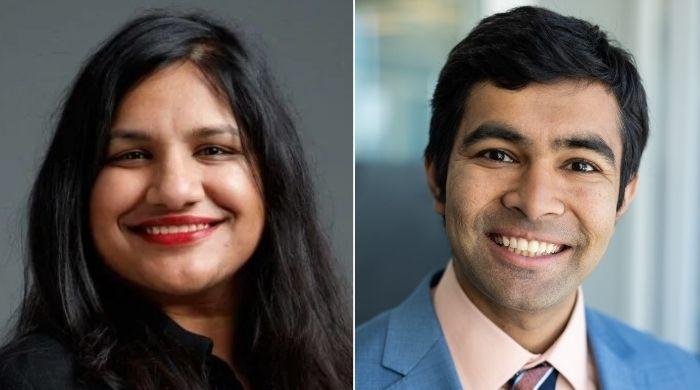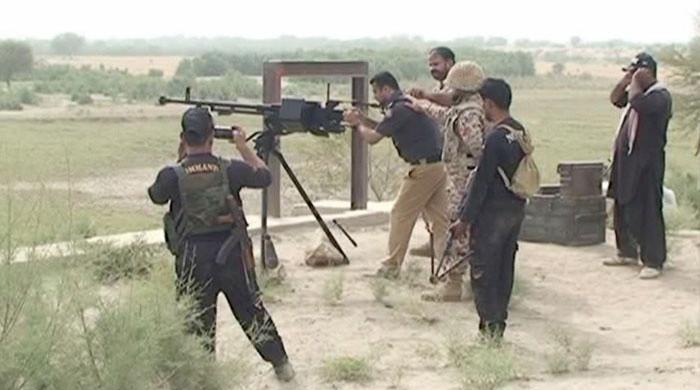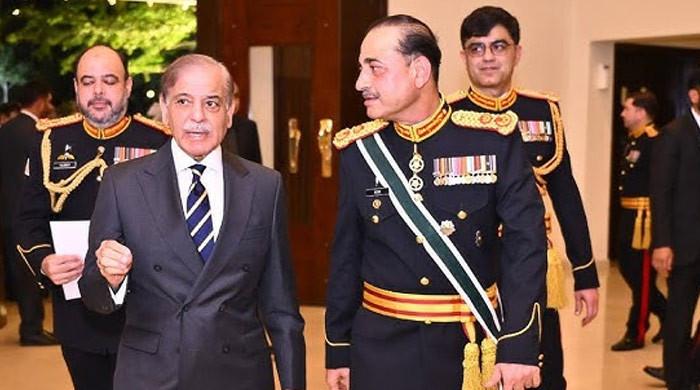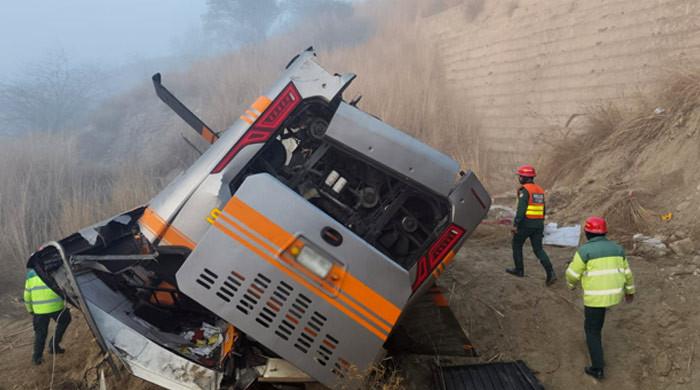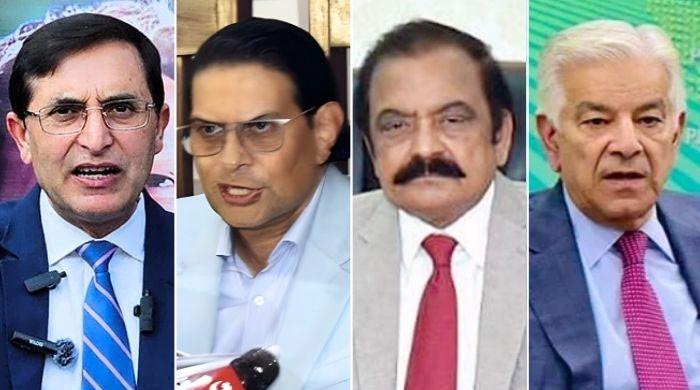Cipher case: IHC rejects Imran Khan’s plea challenging jail trial
IHC CJ Aamer Farooq directs Khan to approach trial court if he has reservations over holding trial in jail
October 16, 2023
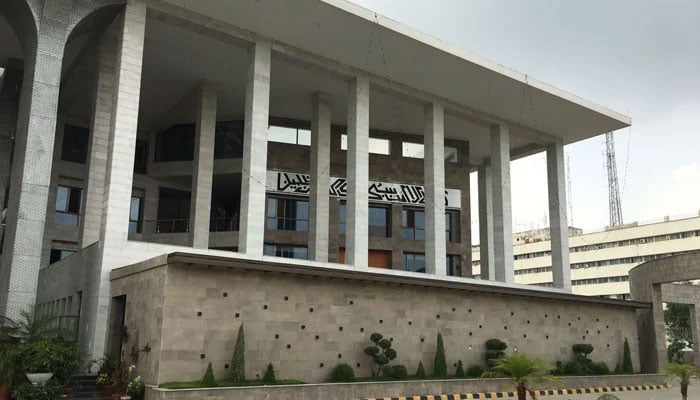
- Court cites security reasons for PTI chief's jail trial.
- IHC asks Khan to approach trial court against reservations.
- Qureshi also moves IHC against his jail trial.
ISLAMABAD: The Islamabad High Court (IHC) has found no malice in holding Pakistan Tehreek-e-Insaf (PTI) chief Imran Khan's jail trial in a cipher case in view of security concerns.
IHC Chief Justice Aamer Farooq announced the court's decision on the PTI chief's plea challenging authorities' move to hold his trial in Adiala jail in the case registered under the Official Secrets Act.
The IHC CJ directed Khan to approach the trial court if he had reservations over the matter.
The PTI chairman, whose government was sent home after a vote of no confidence was passed in the Parliament in April last year, requested the IHC that his trial be held in a court and not the jail.
"The jail trial is in favour of the PTI chairman in view of his security," the court said, adding that Khan has repeatedly expressed his fears about his safety.
Qureshi moves IHC against jail trial
Meanwhile, PTI Vice Chairman Vice Chairman Shah Mehmood Qureshi has also filed a petition in the IHC challenging his jail trial and requesting the court to annul the trial court's order of October 9 in which the special court said that both Khan and the senior politician will be indicted in the cipher case on October 17.
The date for the indictment was set after the copies of the challan, submitted to the court by the Federal Investigation Agency (FIA), were provided to the counsels of the accused.
Qureshi's petition argued that the court restrained the trial court from indicting him.
"My jail trial continues without notification. The court should stop the jail trial and direct an open trial," Qureshi pleaded in his petition.
He also requested the court to conduct the hearing on the matter today.
Khosa terms cipher case 'malicious'
On the other hand, the IHC also heard Khan's another plea seeking dismissal of cipher case and stay of its trial.
During the hearing of the case, the IHC chief justice asked the FIA prosecutor to give its arguments.
The FIA prosecutor requested for the hearing to be adjourned till tomorrow.
Meanwhile, during his arguments, PTI chief's lawyer latif Khosa maintained he was ready for arguments.
"If the hearing has to be adjourned then issue an injunction on the trial," he asked.
However, the judge asked Khosa to proceed with his arguments and also asked the FIA prosecutor to give the written arguments. Khosa submitted his written arguments later.
"Former prime minister Imran Khan was the country's chief executive at the time," the counsel said, speaking about the time Khan spoke about the cipher.
"The chief executive is empowered by his oath in such a situation," he added.
The court asked Khosa if there was a law to declassify documents in Pakistan like that in the United States.
"This cipher was declassified by the federal cabinet," he replied, adding that the cipher was sent to the Foreign Office by Asad Majeed, Pakistan's then-ambassador to the US.
Khosa argued that Khan was earlier sentenced to three years of imprisonment in the Toshakhana case on August 5, which was suspended on August 28. He added that the PTI chairman was, however, already arrested on August 16 in the cipher case.
"It turns out that the special court [hearing cipher case] rejected physical remand on August 16. The court did this in my absence," he said.
Khosa argued that the jail trial took place on August 30, while the hearing was held after the judicial remand.
He added that the former premier has rights. "They have brought forward the statement of Azam Khan who was missing for three weeks. It is absurd to say that PTI chairman took away the cipher," he said.
The Khan's lawyer said the FIA did not give them anything as evidence and is talking about framing the charge tomorrow.
"The nation has expectations from the higher judiciary. I hope you will stand up for the protection of citizens' rights," Khosa said addressing the court.
He also argued that only the code, and not the word cipher, is mentioned in the Official Secrets Act.
The judge asked Khosa about the three points he placed before the court.
He added that the first thing Khosa mentioned was the exemption of Article 248; the second stated that The Official Secrets Act and Section 5 does not apply to the case; and the third point mentioned that it was the prime minister's responsibility to share the cipher with the public."
The lawyer stressed that the cipher case was made on the basis of malice and that 10,000 people of PTI have been arrested.
"The century of registering cases against PTI chairman has completed," the counsel said.
Charge sheet
The FIA, in its challan, stated that the former prime minister and the vice-chairman were found guilty in the matter and requested the court to conduct their trial and sentence them in the case.
According to the sources, former PTI secretary-general Asad Umar's name was not added to the list of accused. Meanwhile, Khan's former principal secretary Azam Khan was also named as a "strong witness" in the case.
The FIA also attached Azam's statements, recorded under Sections 161 and 164, along with the challan, said the sources, adding that the PTI chief kept the cipher to himself and misused the state secret.
The sources also said that Khan had a copy of the cipher but he did not return it.
Moreover, the FIA also attached the transcript of Khan and Qureshi's speech on March 27 — the day when the former premier brandished a letter claiming it was a cipher from a foreign nation, that wanted his government to be removed from power.
The agency also submitted a list of 28 witnesses to the court with the challan after recording their statements under Section 161.
Sources further revealed that the names of former foreign secretaries Asad Majeed, Sohail Mehmood and the then additional foreign secretary Faisal Niaz Tirmizi have also been added to the list of witnesses.
In August of this year, the FIA booked the PTI chief and the party’s vice chairman under the Official Secrets Act for allegedly misplacing and misusing the classified document for their vested political interests.
“Consequent upon the conclusion of the enquiry No. 111/2023 dated 05.10.2022, registered in the CTW, FIA Islamabad, it transpired that former prime minister namely Imran Ahmad Khan Niazi, former foreign minister namely Shah Mahmood Qureshi and their other associates are involved in communications of information contained in the secret classified document (Cipher Telegram received from Parep. Washington dated 7th March, 2022 to Secretary Ministry of Foreign Affairs) to the unauthorised person (i.e. public at large) by twisting the facts to achieve their ulterior motives and personal gains in a manner prejudicial to the interests of state security,” read first information report (FIR) registered against the PTI leaders.
Subsequently, both leaders were arrested in connection with the investigation into the case and a special court was established under the Official Secrets Act to try the accused.
What is the ciphergate?
The controversy first emerged on March 27, 2022, when Khan — less than a month before his ouster in April 2022 — while addressing a public rally waved a letter before the crowd, claiming that it was a cipher from a foreign nation that had conspired with his political rivals to have PTI government overthrown.
He did not reveal the contents of the letter nor did he mention the name of the nation it came from. But a few days later, he accused the United States of conspiring against him and alleged that Assistant Secretary of State for South and Central Asia Affairs Donald Lu had sought his removal.
The cipher was about former Pakistan ambassador to the US Majeed's meeting with Lu.
The former prime minister, claiming that he was reading contents from the cipher, said that "all will be forgiven for Pakistan if Imran Khan is removed from power".
Then on March 31, the National Security Committee (NSC) took up the matter and decided to issue a "strong demarche" to the US for its "blatant interference in the internal affairs of Pakistan".
Later, after his removal, then-prime minister Shehbaz Sharif convened a meeting of the NSC, which came to the conclusion that it had found no evidence of a foreign conspiracy in the cable.
In the two audio leaks that took the internet by storm and shocked the public after these events, the former prime minister, then-federal minister Asad Umar, and then-principle secretary Azam could allegedly be heard discussing the US cipher and how to use it to their advantage.
On September 30, the federal cabinet took notice of the matter and constituted a committee to probe the contents of the audio leaks.
In October, the cabinet gave the green signal to initiate action against the former prime minister and handed over the case to the FIA.
Once FIA was given the task to probe the matter, it summoned Khan, Umar, and other leaders of the party, but the PTI chief challenged the summons and secured a stay order from the court.
The Lahore High Court (LHC), in July this year, recalled the stay order against the call-up notice to Khan by the FIA.





